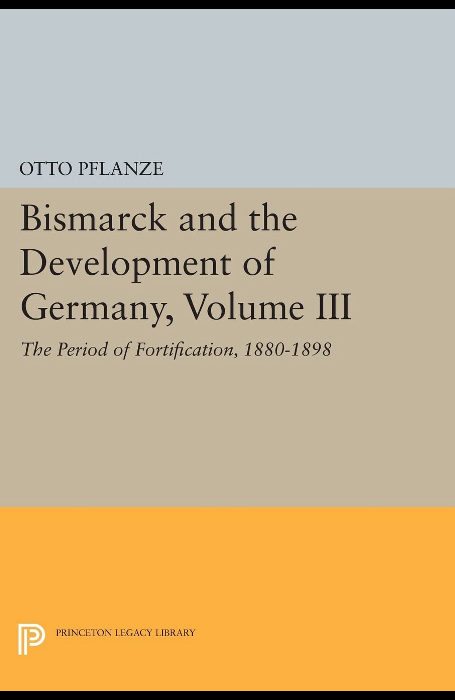Books
Otto Pflanze
Bismarck and the Development of Germany, Volume III
The Period of Fortification, 1880-1898 (Princeton Legacy Library)
How did Otto von Bismarck attempt to consolidate and defend his creation—the German Empire—amid shifting domestic and international challenges in the final decades of his career? Bismarck and the Development of Germany, Volume III: The Period of Fortification, 1880-1898 explores the strategies, successes, and disappointments of Bismarck’s late years as he sought to “fortify” the empire he had unified.
This volume examines Bismarck’s efforts after 1880 to secure the foundations of the German Empire through a combination of domestic policies and foreign alliances. In the early 1880s, Bismarck scored major triumphs by outmaneuvering liberal opposition, reconstructing the Reich executive, and forging new political coalitions to strengthen the Prussian-German establishment. He implemented protectionist tariffs to support German industry and agriculture, negotiated the Dual Alliance with Austria, and launched Germany’s colonial ventures as part of a broader strategy to stabilize the empire and promote economic growth. However, the decade also brought disappointment: the anticipated economic revival from protectionism and colonialism failed to fully materialize, and persistent depression cast a shadow over German society and politics. In domestic affairs, Bismarck’s attempts to suppress socialism through repressive laws were only partially successful, while his pioneering social welfare legislation sought to bind workers to the state and counter the appeal of the Social Democrats. Internationally, Bismarck’s diplomatic skill maintained a precarious balance of power in Europe, but his dominance waned as new challenges emerged toward the end of his chancellorship. The book provides a nuanced analysis of Bismarck’s legacy, highlighting both the consolidation of the German state and the unresolved tensions that would shape its future.
Bismarck and the Development of Germany, Volume III stands out for its detailed examination of the interplay between Bismarck’s domestic and foreign policies during a critical period of German history. Otto Pflanze’s scholarship illuminates how Bismarck’s quest for stability and control left a complex legacy—one that fortified the empire in some respects but also sowed the seeds of future conflict and transformation.

